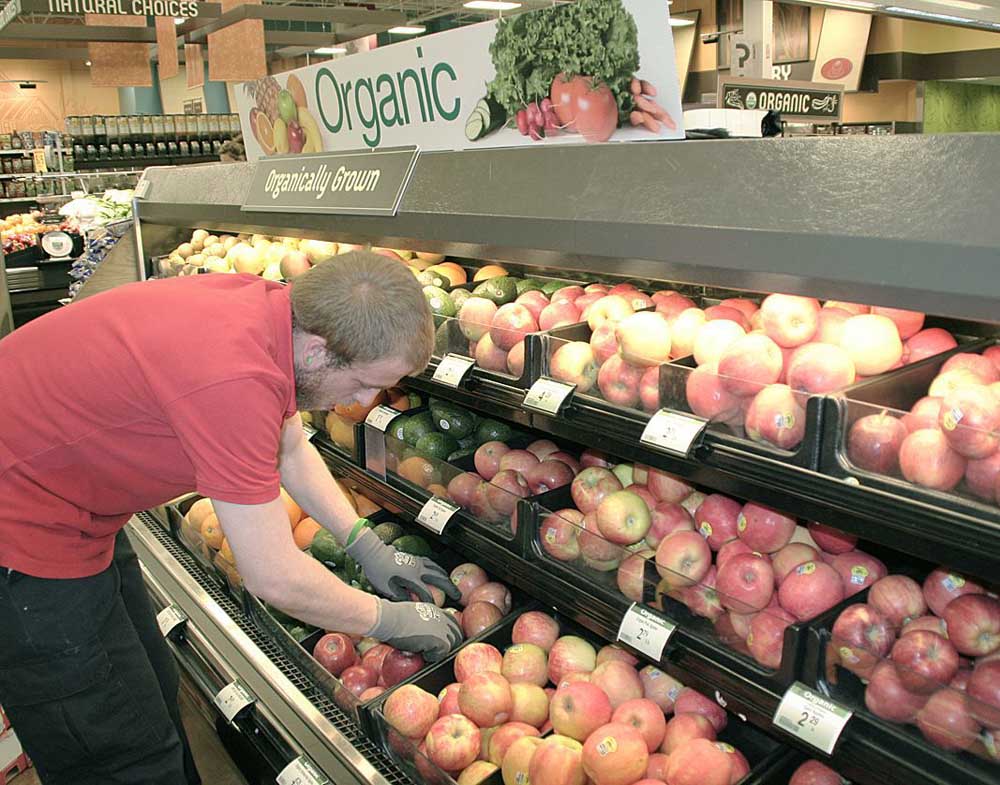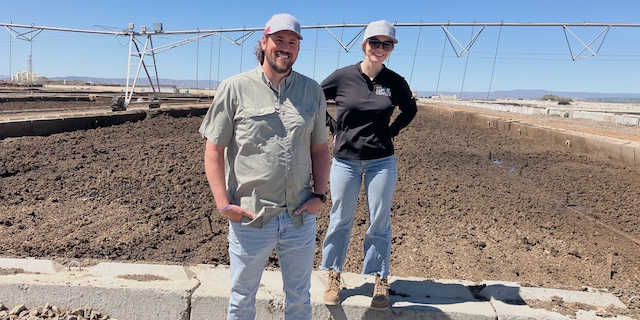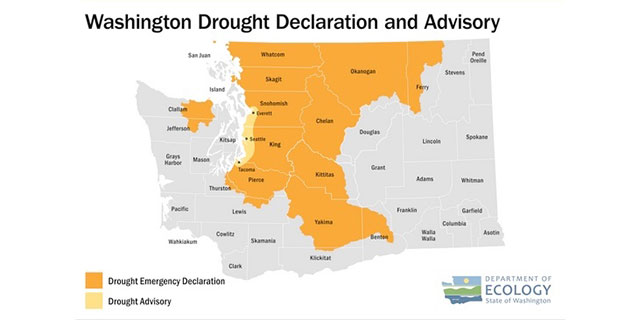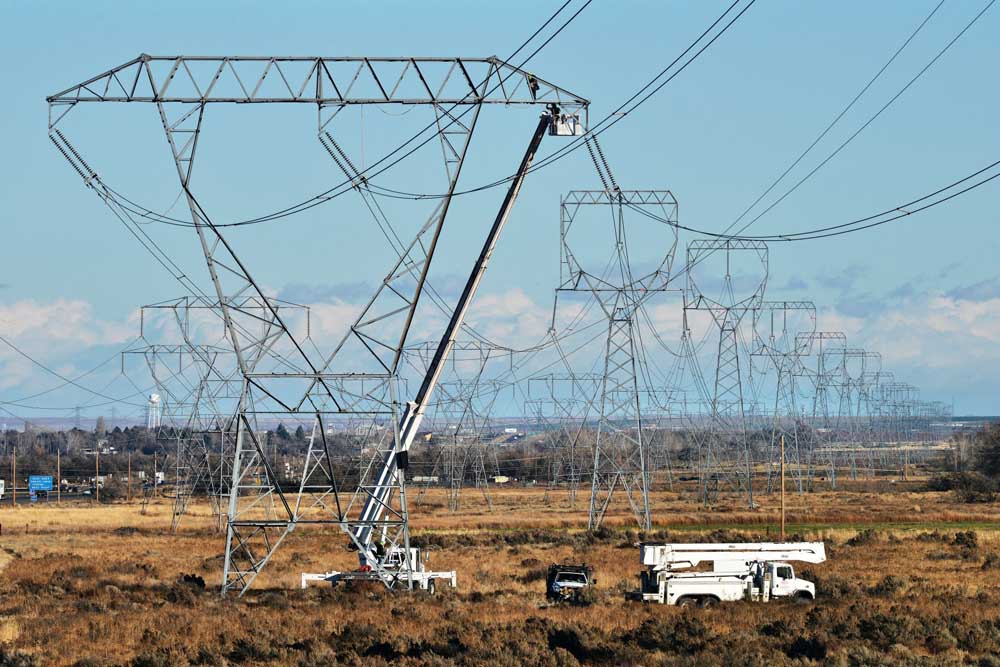Organic apples may run out sooner than usual
Published 9:13 am Tuesday, April 8, 2014

- Dan Wheat/Capital Press Thomas Mathes arranges the organic apple display at the East Wenatchee, Wash., Fred Meyer store on April 8. Dan Gwynne, store director, said they've been able to get the organic apples they've ordered and that all organic food is increasing in quality and sales.
WENATCHEE, Wash. — Apple shippers may run out of organic apples a little sooner this year than they normally do, perhaps at the end of May instead of the end of June.
Several retailers have embraced organic apples and are willing to sell them for less, keeping inventory fresher on shelves and driving increased consumer demand, said Tom Riggan, general manager of Chelan Fresh Marketing.
Another factor is the organic lifestyle continued to grow, even during the recession when retailers backed away, figuring people couldn’t afford it, said Roger Pepperl, marketing director of Stemilt Growers Inc.
“The number of people who buy organic food is way larger than it use to be,” he said.
A better mix of varieties, organic and conventional, are fueling sales of both, Pepperl said. Consumers’ appetite for apples doesn’t seem to be waning despite more inventory nationally with the Michigan and New York crops being back to normal after a short year, he said.
“We’re below last year’s holding (amount left in storage) which is crazy,” he said.
Chelan Fresh sold the last of its 2013-crop organic apples in early March and hopes to make it to the end of April next year, said Kevin Stennes, Chelan Fresh organic sales manager.
“It’s short everywhere. Some organic Pink Lady was up to $65 a box this morning. It was going up from there. I just wish I had some to sell,” Stennes said.
Riggan said Chelan Fresh would like to have organic longer but with strong demand and prices, “the best time to sell is when people want them.”
The organic crop was a bit shorter this year and with good demand the industry may finish at the end of May instead of its normal end of June, Riggan said. A few Red and Golden Delicious organics may be left beyond that but Gala will be done, he said.
The organic retail price is not that much higher than conventional and is sometimes the same and that’s driving sales, Riggan said. Retailers settle for less profit just to keep up with each other, Stennes said.
“No one wants to be the guy without organics in the store,” he said.
David Granatstein, Washington State University sustainable agriculture specialist, told Capital Press last month that demand for organic apples and pears is so strong that growers probably won’t reduce organic production next year after antibiotics to combat fire blight are phased out. A couple years earlier, he thought they would.
Pears are more susceptible to fire blight so loss of the antibiotics will affect them more than apples, Stennes said.
Washington’s certified organic apple acreage peaked at 15,735 in 2009 and hit a low of 13,655 in 2012, Granatstein said. Supply has been short and prices have been hitting new highs, he said.
Growers may reduce acres in fire blight-prone areas but probably will increase overall acreage, Granatstein said. Organics made up 9.6 percent of Washington’s 146,000 bearing apple acres in 2012 and 6.7 percent of sales, he said.
As of April 1, 6.3 million 40-pound boxes of 2013 organic apples had been sold by Washington tree fruit companies and 812,000 boxes remain to be sold, said Dan Kelly, assistant manager of Washington Growers Clearing House Association in Wenatchee. That compares with 6.5 million boxes sold and 2.1 million to be sold a year ago and 5.5 million sold and 1.1 million remaining at this time two years ago, he said. Three years ago, 6 million had been sold and 611,000 were left, he said.
Sales volume isn’t that far off from where it’s previously been but prices are stronger, Kelly said.
The wholesale price of organic Red Delicious was $30.42 a box on March 29 compared with $26.91 a year ago and $25.17 two years ago.
Organic Gala are selling for $40.07 a box this year compared with $33.82 last year and $29.92 two years ago; Fuji are selling for $42.22 a box this year compared with $29.66 last year and $29.12 two years ago; Granny Smith are selling for $38.61 this year compared with $33.82 last year and $30.89 two years ago; and Honeycrisp are selling for $69.27 this year versus $67.50 last year and $52.91 two years ago.
Running out of organic apples isn’t the end of the world because it’s just 6 percent of the crop and conventional apples fill in, Kelly said. Other apple-producing countries don’t grow a lot of organic so imports aren’t a big option, he said.
As of April 1, the total 2013 crop, conventional and organic, stands at 115.1 million fresh boxes — second only to 128.8 million boxes in 2012, Kelly said. About 41.3 million boxes were left in storage compared with 47.3 million the year before and 38.5 million two years ago.
Prices have been “decent,” down from last year but above two years ago, except for Fuji, which is better than both previous years, he said.






